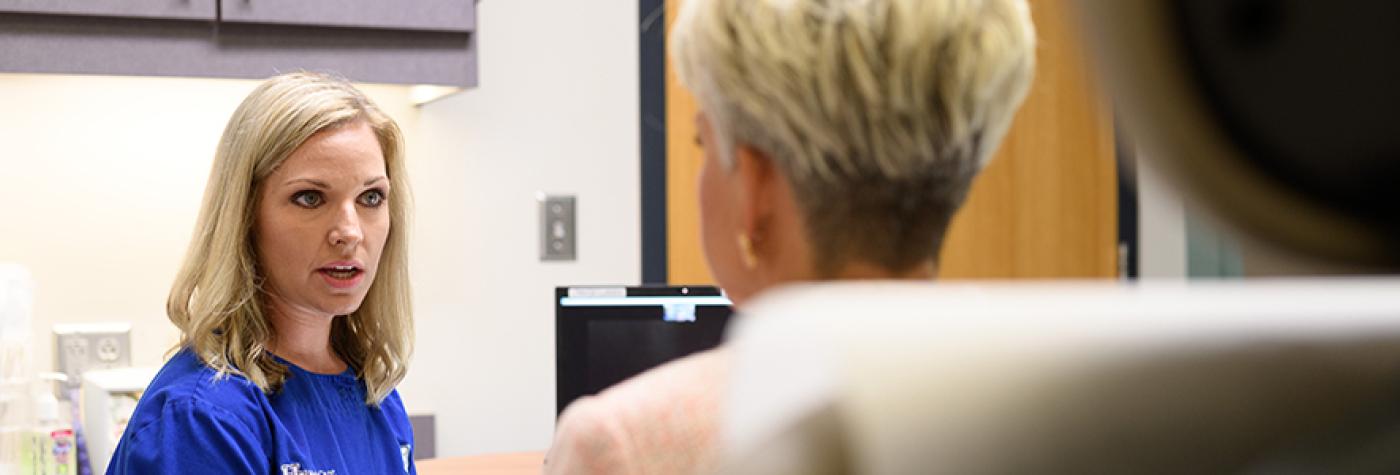If your health care provider believes you may have ovarian cancer, you will need certain exams and tests to be sure. You should expect to be asked questions about your health history, your symptoms, risk factors and family history of disease. Understanding your background will help your provider make a diagnosis.
The first step is for the doctor to take a complete medical history to check for risk factors and symptoms. Then your doctor will physically examine you, including a pelvic exam and possibly a Pap test.
The UK Markey Cancer Center Ovarian Cancer Screening Program provides free annual sonographic screenings to women across Kentucky with the goal of detecting cancer early. When it’s detected early, ovarian cancer is a treatable and curable disease.
You may have one or more of the following tests.
- X-rays. These quick and easy imaging studies uses radiation to create images of the structures within the body.
- Computed tomography. During this imaging test, X-rays create cross-sectional images of the pelvis and reproductive system.
- . This type of imaging study uses powerful magnets and radio waves to create a three-dimensional image of the ovaries.
- Ultrasound. Also known as a sonogram, an ultrasound uses sound waves to create images of the structures of the body.
A biopsy removes tissue or cells to be checked by a pathologist under a microscope. Results from a biopsy help determine if abnormal cells are cancer. Your doctor may perform this procedure in a variety of ways, including bronchoscopy, mediastinoscopy and needle biopsy. Ask your provider about your specific type of biopsy to learn more.
Patients will be contacted after a biopsy by a Markey team member to review results. Further management will be recommended at that time.
When you are diagnosed with ovarian cancer, it is common to feel a sense of urgency around starting treatment. However, in most cases, there is time to do the needed research to ensure that your diagnosis is correct. That may include getting a second opinion.
Our team of experts works together to diagnose, treat and prevent ovarian cancer, with a focus on individualized patient care.
Markey is among the best cancer centers in the nation, according to U.S. News & World Report, when it comes to advanced treatment options, survival rates and experienced providers. As the first and only NCI-designated comprehensive cancer center in Kentucky, Markey is able to serve many patients each year with rare and common cancers, including ovarian cancer.
Our specialized team is happy to work with your doctors and communicate to ensure confidence in your diagnosis.
Should I get a second opinion?
A second opinion can help to ensure that you will be getting the latest and most effective therapy for treating ovarian cancer. The following are common reasons for seeking a second opinion after your initial diagnosis:
- You are having difficulty understanding your diagnosis.
- A dedicated team specialized in your cancer type may not be available in your area.
- There may be uncertainty around the stage of ovarian cancer.
- You may want to learn more about treatment options, including clinical trials and advanced technologies only available at an advanced center like Markey.
- Your health insurance requires a second opinion before continuing toward treatment.
Questions to ask when getting a second opinion
After receiving a cancer diagnosis, you may have a lot on your mind. Here a few questions to keep in mind for your doctor when seeking a second opinion:
- Is there a chance that my medical problem could have a different diagnosis?
- Are there additional tests I should take before moving forward with treatment?
- Do you recommend any treatments at this time?
- What do you expect to happen if I wait or don't have the treatment?
- What are the side effects of treatment?
- How long are treatment recovery periods?
For more information, visit these trusted national sources for educational tools and resources:




















